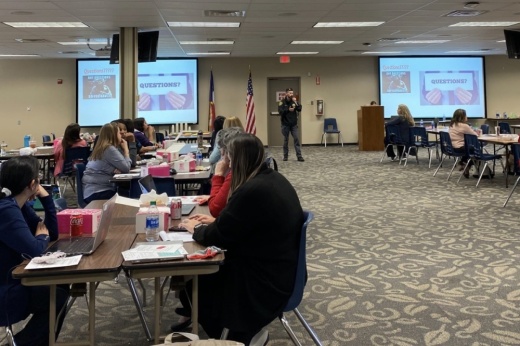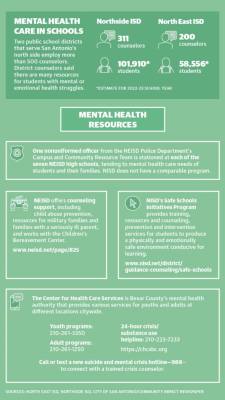In response to rising concerns about mental health, counseling directors at North East and Northside ISDs said they are expanding ways to help local students meet their mental health needs.
On June 27, the San Antonio Department of Human Services released a spring survey of local 12- to 19-year-olds. According to the survey, out of 846 respondents, 37% of youths reported an inability to perform daily tasks, and 49% said they feel helpless, hopeless, numb or like nothing matters.
Most respondents attributed their increasing anxiety and depression to the pandemic’s effects as well as dealing with school and adolescence, including academic rigors, bullying or troubles at home. Also, about half of respondents reported a lack of awareness of resources in their school or community.
Julia Doski, survey co-creator and member of the San Antonio Youth Commission, said the responses reflect a cry for help by local youths.
Northside ISD services
NISD Counseling Director Mary Libby said the district employs 311 counselors, who in recent years have served as many as 100,000 students.
Libby said NISD counselors visit every classroom at all levels, which familiarizes students with counselors.
NISD is now welcoming a new Communities In Schools program that allows a counselor to work with a parent or guardian to refer an at-risk student, if needed, Libby said.
“That becomes the next level of care,” Libby said.
North East ISD support
According to NEISD Guidance Director Rose Garcia, the district employs nearly 200 counselors who serve nearly 60,000 students.
Garcia said she and the district’s counselors are seeing more students wrestling with more problems than those faced by youths in previous generations.
"We are definitely there to help students mentally and emotionally. Mental health is at the forefront with what’s going on with the pandemic,” she said.
Like their NISD counterparts, NEISD counselors check on students inside classrooms and offer additional individual or group counseling for students identified as struggling to form and maintain healthy relationships or coping with some other personal challenge.
Garcia said teachers, parents, guardians and administrators may refer a student to extra counseling, if needed, if they notice a child being withdrawn or reacting in a certain negative way.
“We’re not doing therapy in schools, but like in group counseling, we bring together students who are experiencing the same thing and [assure them] that they’re not going through the same things alone,” she said.






